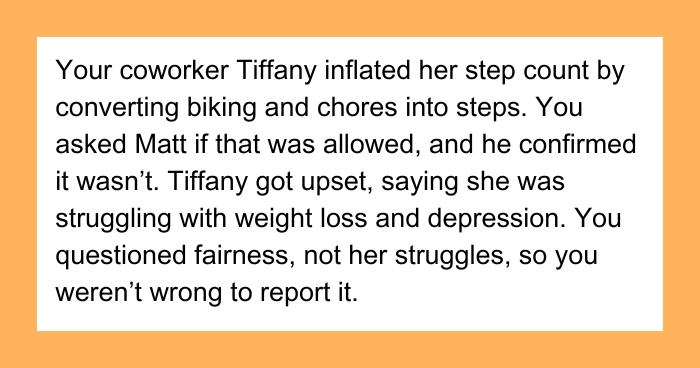“AITA for reporting my coworker for cheating in the company walking competition?”
As an example of this, your company organized a voluntary step challenge whereby anyone able to average at least 5,000 steps per day could earn a half-day off work and the winner would receive an Apple Watch! The rules were cut and dry — track steps from your everyday life, including runs, which was clearly confirmed by Matt, the competition manager.
You looked forward to it, and you were going back and forth with Dave and Jenna, all egging one another on to greater step counts. Then Tiffany, who had been registering a decent number of steps, went from somewhere near the 50k mark straight up to 65,000 for one day in the middle of the competition. So she told you when you asked, but she was not really taking steps, rather she was using an online chart based on activity to translate things like biking, stretching, and washing the dishes into step equivalents.
This rang of “not a step” competition, and so you asked Matt if biking counted, and he told you it did not. Tiffany later called you out on it, saying you were unsupportive, claiming her high step count was a milestone in her weight-loss journey. Which left you waffling back and forth wondering if you had done the wrong thing by reporting her.
Read for more info Reddit















Defining Fair Play in Workplace Contests
Competitions in a professional setting are meant to be fun, motivational, and fair. However, fairness only exists when all participants follow the same set of rules. When a contest revolves around step counts, using alternative activity conversions, especially for non-walking activities, creates an uneven playing field.
Tiffany’s use of a step-equivalent chart might have been an honest misunderstanding, but once she included cycling and even household chores, it became clear she was inflating her numbers in a way that wasn’t comparable to what other participants were doing. Given that an Apple Watch was at stake, this raises ethical concerns about fairness and integrity.
The Psychological Impact of Workplace Competitions
Research on workplace competitions suggests that they can be great motivators but also sources of stress, particularly when employees feel they are losing unfairly. A 2018 study published in the Journal of Occupational and Organizational Psychology found that perceived unfairness in workplace contests can lead to decreased morale and resentment. This may explain Tiffany’s defensive reaction—she may have genuinely believed she was doing her best and was suddenly confronted with the idea that her effort didn’t count. However, fairness matters, and letting rule-breaking slide could have caused more damage by discouraging others.
Addressing Tiffany’s Emotional Response
Tiffany’s response focused on her struggles with depression and weight loss rather than the fairness of the competition. While her emotions are valid, they don’t change the fact that she was bending the rules. Many workplace conflicts arise when employees conflate personal struggles with professional fairness. It’s okay to be empathetic, but it doesn’t mean that dishonesty should be ignored.
Your approach—asking for clarification from Matt rather than confronting Tiffany aggressively—was reasonable. If anything, Matt should have proactively communicated clearer rules to prevent misunderstandings.
Here’s what top commenters had to say about this one:






It was ON-THE-NOSE for you to report Tiffany’s fake step count. Workplace competitions have to be fair, and letting her turn unrelated activities for money into steps would have been cheating (at first) the integrity of the competition. You did not personally attack her, you simply asked for clarification. Even if Tiffany is going through her own struggles, that does not mean you are not in the wrong.
At the very least, this shows the importance of clearer, upfront guidelines from companies to minimize misunderstanding and discord.

